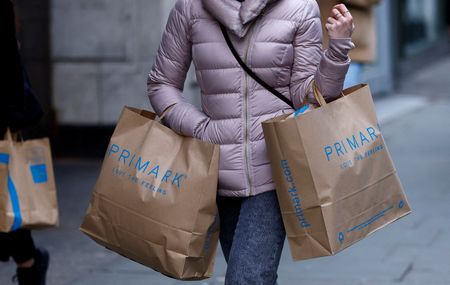 1
1 1
1
By James Davey
LONDON (Reuters) – In April 2020, budget fashion chain Primark was on its knees, unable to sell hundreds of millions of pounds of stock with its entire store network shut in COVID-19 lockdowns and no online capability.
Fast forward three years and the retailer, unlike several former competitors, is starting to thrive again, having navigated the turbulence of the pandemic and Russia’s invasion of Ukraine, and now appealing to cash-strapped customers with its value offer and breadth of product range.
And unlike most clothing retailers it is accelerating expansion, with an eye on the long-term prize of a much bigger presence in the United States.
“When we were shut that was an existential threat to us but we were also being told that we’d never recover,” George Weston, CEO of Primark’s parent Associated British Foods, said on Tuesday. “But we recovered our prior value (UK) market share last year and this year we’ve established new record levels.”
The company has broadened its product range to higher priced items, Weston told Reuters in an interview.
“We’re attracting a new sort of customer,” he said, noting Primark has also benefited from the demise of rivals Debenhams and Arcadia.
It has seen a positive reaction to its spring and summer ranges but remains cautious that still accelerating living costs and higher interest rates will pare sales growth.
Primark currently trades from 418 stores in 15 countries.
It is targeting 530 stores by 2026, accelerating growth in the major markets of the U.S., France, Italy and Iberia and restructuring its German business. Thirteen new stores were opened in the first half.
On Tuesday, Primark said it would expand into the southern U.S. states, including Texas, served by a new warehouse in Jacksonville, Florida.
The company is confident its model can succeed in a U.S. market that has been a graveyard for some of Britain’s biggest retailers, including Marks & Spencer and Tesco.
Its five-year plan will take Primark from 16 U.S. stores currently to about 60 stores by September 2026.
(Reporting by James Davey; Editing by Tomasz Janowski)